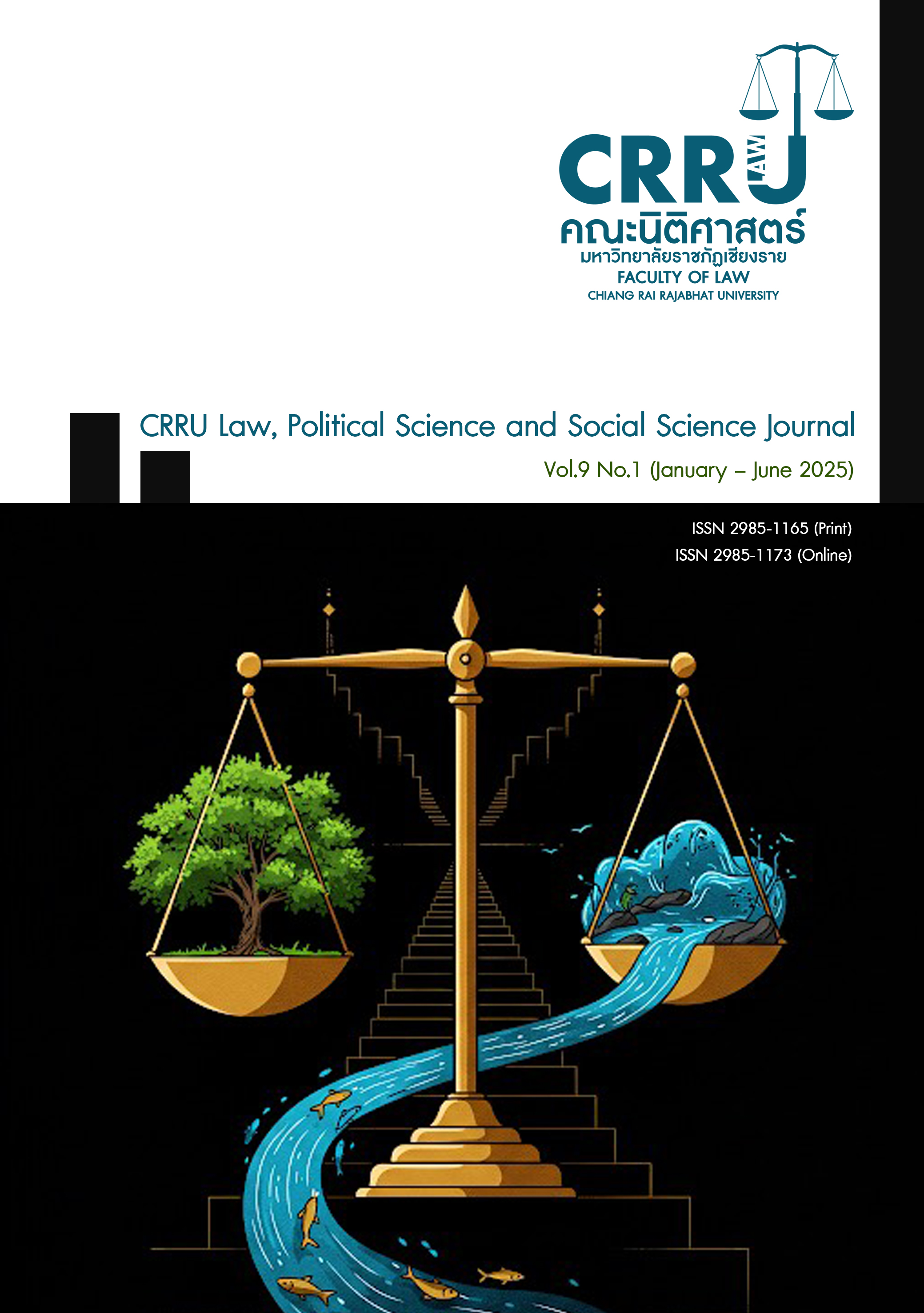Measures to Promote and Support the Use of Intellectual Property as Business Collateral for Startup in Thailand
Main Article Content
Abstract
A startup is a business model that uses innovation or technology to develop products or services that create added value and drive rapid growth. It also contributes to Thailand’s economic development. Many countries actively promote and support startups, particularly in accessing funding through the use of intellectual property (IP) as collateral. Although Thailand enacted the Business Security Act in B.E. 2558 (2015) to allow the use of IP as business collateral, Thai startups still face various challenges, such as limitations in using IP as collateral, restrictions that only permit financial institutions and designated entities to accept collateral, enforcement issues with IP as collateral, and legal ambiguities. These challenges differ from countries like England and the United States, where IP is widely used as collateral. Based on a comparative study of relevant laws in Thailand, England, and the United States of America, as well as an analysis of existing challenges and obstacles, the researcher proposes measures and strategies to promote the use of IP as business collateral more effectively. These include increasing support to enable startups to utilise IP as collateral, revising and improving relevant laws to facilitate IP collateralisation, and developing systems that maximise the utility of IP assets. Such efforts will enhance the ability of Thai startups to access funding efficiently and sustainably, increasing their competitive potential both domestically and internationally. Moreover, these initiatives will further support the use of IP in adding value to the national economy.
Article Details
References
กรวิทย์ เอ่งล่อง. “ลักษณะและแหล่งเงินทุนของวิสาหกิจเริ่มต้นในประเทศไทย.” สารนิพนธ์ปริญญามหาบัณฑิต วิทยาลัยบริหารธุรกิจนวัตกรรมและการบัญชี มหาวิทยาลัยธุรกิจบัณฑิตย์, 2562. https://libdoc.dpu.ac.th/thesis/Korawit.Eng.pdf. สืบค้นเมื่อ 13 พฤศจิกายน 2567.
ข่าวสด. “กรมทรัพย์สินทางปัญญา พัฒนาแพลตฟอร์มตลาดกลางทรัพย์สินทางปัญญา (IP Mart).” 2566. https://www.khaosod.co.th/pr-news/news_7844051. สืบค้นเมื่อ 7 พฤศจิกายน 2567.
จักรกฤษณ์ ควรพจน์. กฎหมายสิทธิบัตร แนวความคิดและบทวิเคราะห์. กรุงเทพฯ: นิติธรรม, 2560.
ชนาธิป ลิ้มขจรเดช. “ปัญหากระบวนการในการบังคับหลักประกันทางธุรกิจ.” เอกัตศึกษา คณะนิติศาสตร์ จุฬาลงกรณ์มหาวิทยาลัย, 2563.
ณัชพงษ์ สำราญ. “นโยบายและกฎหมายกับการส่งเสริม Startup ในประเทศไทย.” วารสารวิชาการมหาวิทยาลัยหอการค้าไทย มนุษยศาสตร์และสังคมศาสตร์ 40, ฉ.4 (ตุลาคม-ธันวาคม 2563): 200, 201–203.
ธัญญาภัส ทองมุสิทธิ์, และศิวพร เสาวคนธ์. “การพัฒนาตลาดซื้อขายทรัพย์สินทางปัญญาที่เป็นหลักประกันตามกฎหมายว่าด้วยหลักประกันทางธุรกิจ.” วารสารวิชาการนิติศาสตร์ มหาวิทยาลัยทักษิณ 10, ฉ.12 (มกราคม-ธันวาคม 2565): 216.
ภัทรพร เกาฑัณฑ์ทอง. “การจดทะเบียนสัญญาหลักประกันทางธุรกิจ: ปัญหาและการบังคับใช้.” วิทยานิพนธ์ปริญญานิติศาสตรมหาบัณฑิต มหาวิทยาลัยธรรมศาสตร์, 2560.
ระวิวรรณ ทวิชสังข์. “ปัญหาหลักประกันตามพระราชบัญญัติหลักประกันทางธุรกิจ พ.ศ. 2558.” วิทยานิพนธ์ปริญญานิติศาสตรมหาบัณฑิต สถาบันบัณฑิตพัฒนบริหารศาสตร์, 2562.
วิจัยกรุงศรี. “บทบาทของหลักประกันในภาคการธนาคารยุคใหม่.” 2564. https://thaipublica.org/2021/04/krungsri-research-the-role-of-collateral-in-the-modern-banking-world-01/. สืบค้นเมื่อ 13 พฤศจิกายน 2567.
สถาบันวิจัยเพื่อการพัฒนาประเทศ. “ใช้ทรัพย์สินทางปัญญาค้ำประกันเงินกู้เกิดได้หรือไม่.” 2016. https://tdri.or.th/2016/10/2016-09-01/. สืบค้นเมื่อ 10 พฤศจิกายน 2567.
สำนักงานนวัตกรรมแห่งชาติ. “สตาร์ทอัพ/สมาร์ทเอสเอ็มอี/กิจการเพื่อสังคม.” 2567. https://www.nia.or.th/segment/startup-social-enterprise. สืบค้นเมื่อ 1 พฤศจิกายน 2567.
อิสรัตน์ ธำรงมาศ. “แนวทางการบังคับสิทธิในการนำทรัพย์สินทางปัญญาเป็นหลักประกันทางธุรกิจตามพระราชบัญญัติหลักประกันทางธุรกิจ พ.ศ. 2558.” การค้นคว้าอิสระ นิติศาสตร มหาบัณฑิต มหาวิทยาลัยกรุงเทพ, 2558.
Andhov, Alexandra. Importance of Start-up Law for Our Legal Systems. Cheltenham, UK: Edward Elgar Publishing, 2020.
Bjerre, Carl S., Kleinberger, Daniel S., Smith, Edwin E., and Weise, Steven O. “LLC and Partnership Transfer Restrictions Excluded from UCC Article 9 Overrides.” 2019. https://businesslawtoday.org/2019/02/llc-partnership-transfer-restrictions-excluded-ucc-article-9-overrides/. accessed November 7, 2024.
Bornheim, Jan Jakob. Security Rights in Intellectual Property in England and Wales. Berlin: Springer, 2020.
FasterCapital. “Success Stories of Startups Using IP as Collateral.” 2024. https://fastercapital.com/topics/success-stories-of-startups-using-ip-as-collateral.html. accessed November 7, 2024.
Griffin Mills, Alicia. “Perfecting Security Interests in IP: Avoiding the Traps.” The Banking Law Journal 125. No.xv (September 2008): 751–52.
Gough, William James. Company Charges. London: Butterworths, 1978.
IIPRD. “IP as Collateral.” 2021. https://www.iiprd.com/ip-as-collateral/. accessed November 7, 2024.
Leesa-nguansuk, Suchit. “Flash Group Becomes First Thai Unicorn.” 2021. https://www.bangkokpost.com/business/general/2124699/flash-group-becomes-first-thai-unicorn. accessed December 10, 2024.
Mills, Alicia Griffin. “Perfecting Security Interests in IP: Avoiding the Traps.” The Banking Law Journal 125, No. xv (September 2008): 751–52.
NatWest. “Sci-Net Secures Market-First IP-Backed Loan.” 2024. https://www.natwest.com/corporates/about-us/case-studies/sci-net-secures-market-first-ip-backed-loan.html. accessed November 7, 2024.
UK Intellectual Property Office. Banking on IP? The Role of Intellectual Property and Intangible Assets in Facilitating Business Finance. Intellectual Property Office Research Paper No. 2013/34.
World Intellectual Property Organization. “Country Perspectives: The United Kingdom’s Journey.” WIPO Publication. No.RN2023/42, (2023): 38–40.
World Intellectual Property Organization. “Utility Models.” 2024, https://www.wipo.int/web/patents/topics/utility_models, accessed November 7, 2024.


